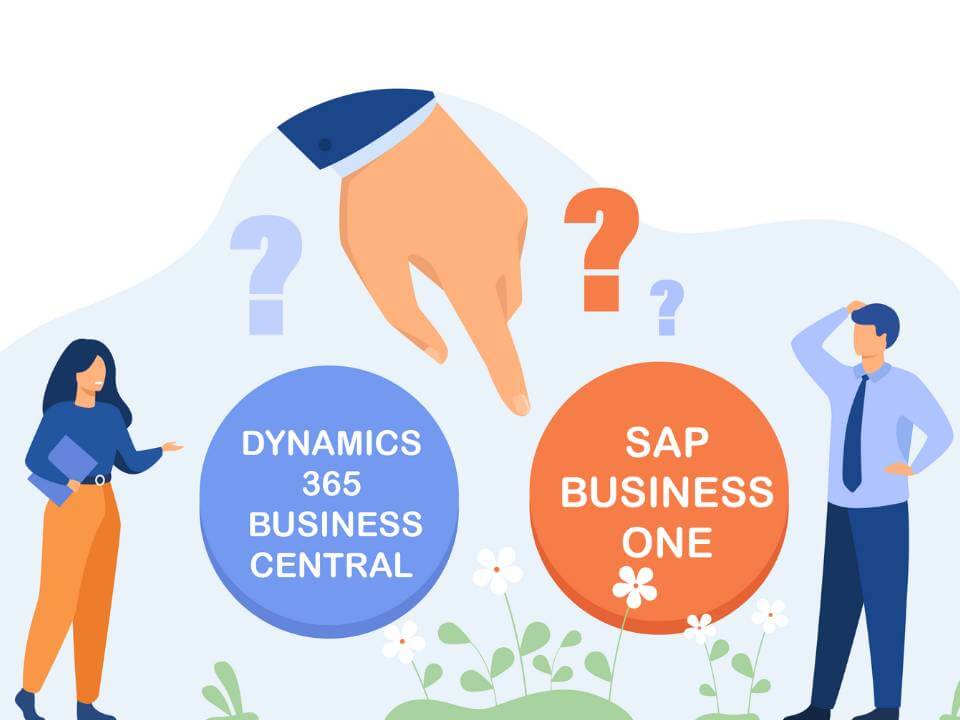If you haven’t already, there’s never been a better time to launch your company’s digital transformation. Investing in a cloud-based ERP can be a great place to begin.
Enterprise resource planning software helps you manage and integrate all your business’s financials, operations, planning, reporting, and more in one fully integrated system. Before choosing an ERP for your company, it’s essential to consider all your options so you choose one that meets your organization’s unique needs.
In this blog, we’ll compare Microsoft Dynamics 365 Business Central with SAP Business One (SAP B1).
Comparison of Dynamics 365 Business Central and SAP B1
Two of today’s biggest players in the ERP market, Business Central and SAP B1, have distinct differences in features and functions. While both products are targeted to SMBs, Business Central tends to get higher marks in areas like financials, human resources, and operations management. Let’s dive in.
Microsoft Dynamics 365 Business Central Overview
Microsoft Dynamics 365 includes both CRM and traditional ERP system capabilities to help you manage a broad range of business functions. Valued for its easy customization and full integration, Microsoft Dynamics 365 Business Central is a proven ERP solution for businesses ready to upgrade from their legal accounting software.
SAP Business One Overview
SAP B1 offers an integrated system that provides real-time information on your most critical business metrics. Built to run on the Microsoft SQL Server, the software can be deployed on-site and in the cloud. Its mobile app enables you to access analytics, sales, and service functions.
Business Central and SAP B1 Feature Comparison
Now let’s take a look at how Business Central and SAP B1 perform in fundamental ways.
Productivity
One of the greatest benefits of an ERP solution is how it increases productivity. Business Central offers agile manufacturing operation automation that simplifies production planning and cost management visibility. Your business can adapt quickly to changing market demands while steadily driving business growth. SAP B1 is excellent at helping to manage inventory, but it tends to be perceived as being too complicated and not necessarily designed for future growth.
Integrations
Business Central offers a native connection between LinkedIn and CRM Sales that can quickly provide all the information you need on customer records. It integrates with other Microsoft products like Office 365, Azure, Outlook, and more. SAP B1 is an ERP company first. It can integrate with third-party applications, but each integration can require a separate tool.
Usability
Business Central delivers a high-quality consumer-grade experience. It offers complete visibility across customer service, distribution, sales, and marketing and provides real-time live views of the data you need to make better decisions. The software’s CRM functionality lets you efficiently manage opportunities, campaigns, and contacts. It’s also simple to automate and streamline your supply chain with sales and purchase order management.
One of the most common complaints about SAP B1 is with respect to its error handling and difficult troubleshooting process. It offers limited human resources management functionality, and its dashboard and cockpit features are less robust than Business Central’s.
The ERP Choice is Clear
Which ERP solution you choose depends on your organization’s specific needs. Both Business Central and SAP B1 offer terrific features, but Business Central is often the better choice for SMBs focused on scalability and growth. And because it easily integrates with different Microsoft products your business already uses, Business Central can be the perfect choice for bringing together your business applications productivity, communication, and collaboration tools. Contact Us to learn more about using Microsoft Dynamics 365 Business Central in your business.



